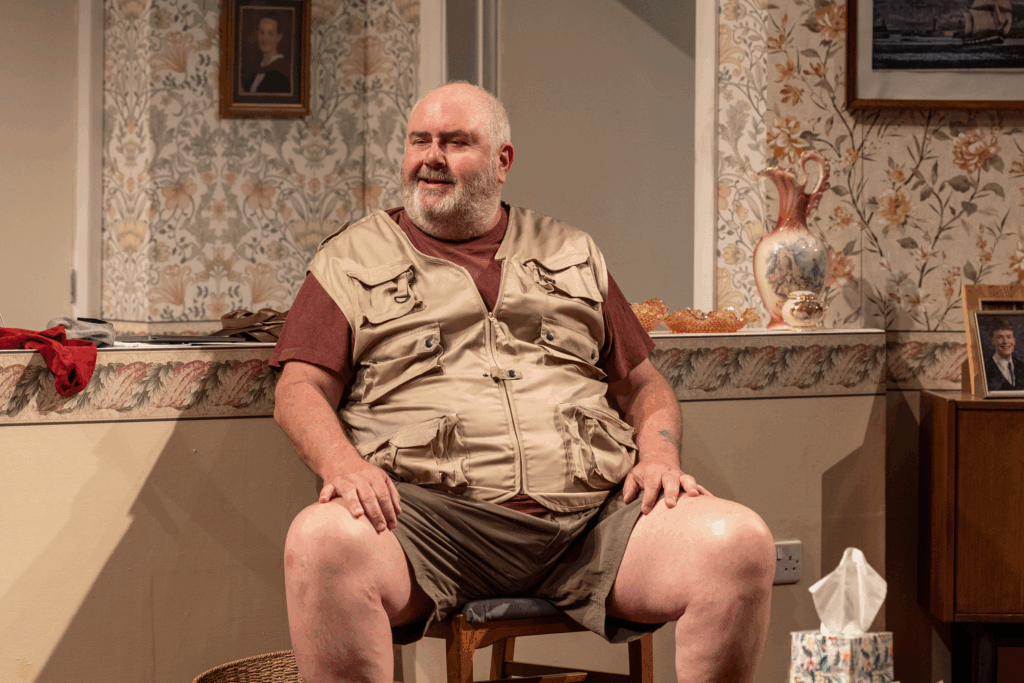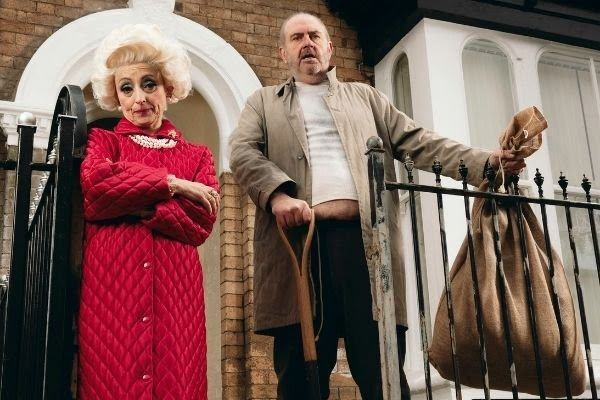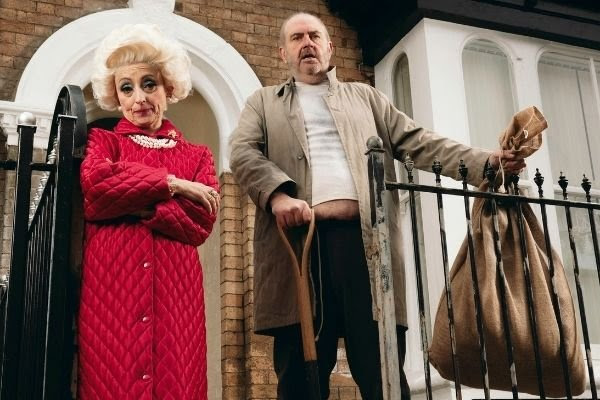
Nothing forced about Adrian Hood’s “Rhubarb” Eddie in Richard Bean’s To Have And To Hold at Hull Truck Theatre
TO Have And To Hold began life at the Hampstead Theatre in London in November 2023 with a cast led by Alun Armstrong and Maria Bailey as an aged East Riding couple bickering more than ever after 60 years.
It is only right , however, that Hull playwright Richard Bean’s tragic-comedy should find its way back to his home city, with director Terry Johnson still at its helm. For like a gardener knows his scallions from his shallots, Bean knows his Wetwang (“wet land”) from his Driffield (“dry land”).
The theme of ageing, of passing on, and passing on the family baton, is universal, but planting To Have And To Hold on home soil makes it more fertile. Likewise, the sight of Hull Truck stalwart Adrian Hood filling a doorway reprising his Hampstead role back on familiar terra firma feels even more right.
Hoody is playing “Rhubarb” Eddie, and on his first entry we recognise him as much from the oversized sticks of Yorkshire’s champion vegetable, clasped to his midriff, as from Hood’s formidable frame, head still out of view.
Bean is as much a master of physical comedy as verbal wit, the two combining delightfully in the opening scene as Florence (Paula Wilcox, yes, Paula Wilcox, from Man About The House, Emmerdale and Driving Miss Daisy at York Theatre Royal) chugs up and down on a Stannah stairlift, torn between answering the voice at the door and the voice from the bedroom. The snail-slow build-up to the punchline makes it all the better.
Florence and former copper Jack (Ian Bartholomew) are as well worn as their Wetwang house in Dawn Allsopp’s design, with its faded wallpaper, black-and-white photographs and service hatch, through which Florence will pop her head like a cuckoo clock, forever offering to make cups of tea.
Into their nineties, forgetful Florence and the ailing yet mentally sharp Jack are at that Vladimir and Estragon stage in their relationship, finding each other endlessly irritating, yet inseparable, but not so much waiting for Godot as the creeping shadow of death. Such is the witty observation of Bean’s writing that they are very good company for the audience, their grouchy point scoring mirroring the spats of a double act.
Bean ekes comedy out of the stasis and foibles of an acrimonious relationship in a geriatric groove rather than a rut, and the erosion of memory that has Florence confusing names, whether calling Rob “Tina” or reaching for the elusive name of a movie director. You find yourself joining in the hunt under your breath.
Bean is far harsher on their offspring, just as middle-aged son and daughter are harsher too in their judgements, albeit with a residue of fondness and amused bemusement, even cringing, at the behaviour of their parents, who nevertheless continue to show unconditional love in absentia, albeit with head scratching aplenty at what has become a north-south divide.
Rob (Stephen Tompkinson) and Tina (Rebecca Johnson) visit only rarely – almost to the point of neglect – having long migrated from the family nest to pursue ambitions fuelled by education beyond their parents. Malcontent Rob is a TV and book writer of detective dramas, his time divided between London and Los Angeles; career-driven Tina is a private health care entrepreneur, living the Somerset lifestyle.
Whereas Florence and Jack trade harmless barbs, Rob and Tina drop bombs with damaging results for the parents’ regular visitors, odd-job man “Rhubarb” Eddie, and chippy cousin Pamela (Sara Beharrell), who both come under scrutiny over missing money as Bean weaves a mystery thread into his blistered domestic drama.
Bean worked as a psychologist and stand-up comedian before play writing took over, and comedy is always his first instinct, be it in one-liners or putdowns, or Florence referring to Jack’s “enlarged prostrate”. Yet amid the quips with everything, the psychologist is at work, exploring the impact of strained relationships and wounding words, accusations and recriminations.
The sudden insurgence of Covid has a transformative impact too. Bean’s plays often have pulled the rug from under the comedy with shards of darkness that echo the works of John Godber and Alan Ayckbourn. Here, instead, a redemptive rainbow follows that hail storm, involving the stories of his days on the beat that Jack has been recording secretly through the play. Bean now adds a gift for storytelling to his repertoire of combative comedy and cultural commentary.
Under Johnson’s finely tuned direction, Tompkinson’s irascible Rob, Wilcox’s frustrated yet perky Florence and Bartholomew’s physically frail but still assertive Jack excel, with impactful support from Johnson and Beharrell. Hood, the perennial scene stealer, once again is the comic apotheosis of less is more, dipping into pathos too. He puts you in mind of a northern Tommy Cooper, physically funny but with instinctive timing too.
Just as he did for Martin Barrass,when writing the elderly waiter Alfie in One Man, Two Guvnors expressly for his fellow son of Hull, so Bean has given Hood the ideal role for his deadpan delivery and comedic candour.
To Have And To Hold, Hull Truck Theatre, Hull, until Saturday, 7.30pm plus 2pm Wednesday, Friday and Saturday matinees. Box office: 01482 323638 or hulltruck.co.uk.




